Andrew Hulshult 2024 Interview: DOOM IDKFA, Blood Swamps, DUSK, Iron Lung, AMID EVIL, Music, Guitars, Cold Brew Coffee, and More
When I first delved into the world of boomer shooters last year on platforms like Steam Deck and Switch, aside from industry giants like New Blood and Nightdive, one name consistently stood out: Andrew Hulshult. Known for his remarkable contributions to game music over the years, Andrew recently lent his talents to the re-release of DOOM and DOOM II, introducing his IDKFA soundtrack with fresh tunes for DOOM II. Having long admired his work, I finally seized the opportunity to speak with him in a lengthy video call, which we later transcribed and edited for clarity. Much like my casual chat with Dave Oshry from New Blood, this interview was relaxed and, at over an hour long, it's likely the most extensive interview we've featured on TouchArcade. So, settle in and perhaps grab a cold brew as we dive into Andrew's world of game soundtracks, composition, his favorite bands, guitar gear, cold brew coffee, his foray into film soundtracks, and much more.
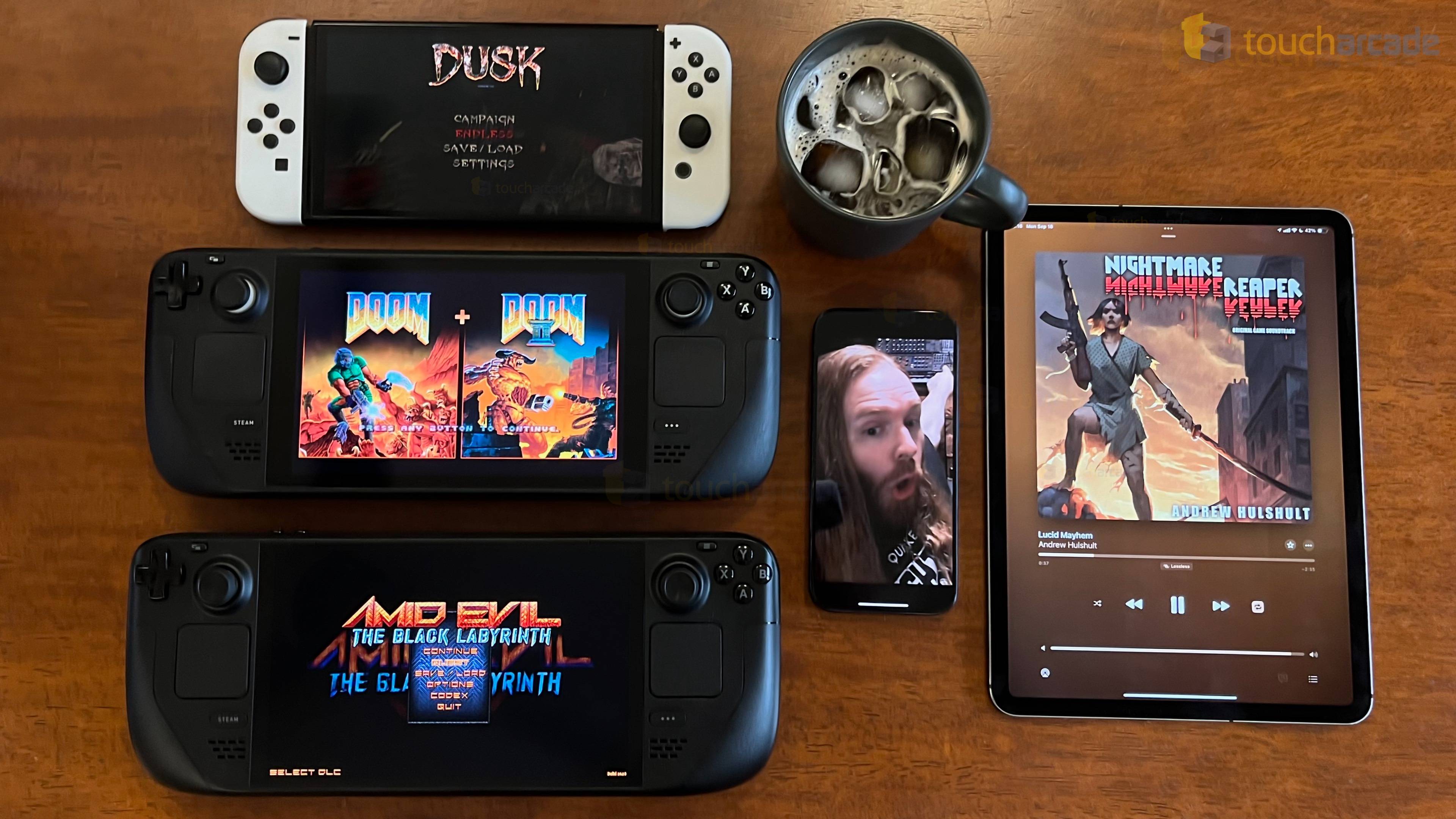
TouchArcade (TA): For those who might not know you, could you introduce yourself and explain what you do?
Andrew Hulshult (AH): Sure, I'm Andrew Hulshult. I'm primarily a composer and sound designer for video games, though I'm branching out into film as well. I also enjoy writing music independently when it's not tied to a project. My main focus is creating soundtracks, sound design, and occasionally, I dabble in voice acting within the game and film industries.
TA: How did you end up working on the canceled Duke Nukem project and also Rise of the Triad 2013?
AH: Duke Nukem 3D Reloaded started around 2010. Frederik Schreiber, now at the helm of 3D Realms, was remaking Duke 3D maps in Unreal Engine 3 and posting them on Gearbox forums. His work caught my eye, especially the Hollywood Holocaust map, which looked fantastic. I reached out, offering my music services, and he welcomed the idea. I had the gear and wanted to learn, so I jumped in and began remaking some of the Duke 3D tracks. Though not much came of Duke 3D Reloaded, it led to an opportunity with Apogee. Terry Nagy reached out about working on Rise of the Triad, and with an investor named Dave Oshry, we embarked on what became Rise of the Triad 2013. It was an exciting time, being part of the retro FPS revival.
TA: It's funny you mention Dave Oshry because getting an interview with him felt like meeting Iron Maiden. After that, I had New Blood covered. I also interviewed Nightdive about The Thing, but to complete the trifecta for boomer shooters, I needed to talk to you, Andrew Hulshult. And here we are.
We both laugh.
TA: In a prior interview, you mentioned not realizing your demand in the industry until after your work with 3D Realms ended. Suddenly, you had numerous opportunities. You've worked on significant titles since then, including the DOOM Eternal DLC, which many associate with you. For me, it's games like Nightmare Reaper and Dusk. How have you evolved as a musician and professional from then until now?
AH: That's a great question. Starting in the industry with Interceptor was a fresh experience. At first, you're unsure about your worth and the right compensation. It's a learning curve filled with trial and error. I've learned from every project and agreement, figuring out what works and what doesn't. As a musician, the core principle is to create beautiful art, but you also need to ensure you're paid fairly to sustain your career. This realization came right after my time with 3D Realms, when I nearly walked away from the industry. But stepping away opened up numerous opportunities, leading to projects like DUSK and AMID EVIL.
I've worked in a music retailer for 15 years, and that job consumed me much like my work with 3D Realms did. When you're working for a company instead of yourself, it's easy to lose focus on other aspects of life. The journey from then to now has been a continuous learning process, navigating through agreements and finding what works best.
TA: Given your experience, what's the biggest misconception people, both in the industry and among players, have about video game music?
AH: The biggest misconception is that anyone can do it and it's a small part of game development. laughs It's far from easy. You have to immerse yourself in the game's world, respect the designer's vision, and confidently propose your ideas. It's complex, requiring both artistic and social skills. Many think it's a simple job, but it's far from that. I often tell my friends who say it's easy to try it for a day.
Whiskey and coffee fueled half of the @RiseoftheTriadOST. Most songs were composed between 9pm and 3am.
The more you know
— Andrew Hulshult (@AndrewHulshult) September 30, 2015
TA: Let's discuss your gear, but first, let's dive into some game-specific topics. Starting with ROTT 2013, I've shared a tweet with you about it (linked above). I didn't know much about the soundtrack until recently when friends mentioned it. I played the original on DOS but not the 2013 version until the Ludicrous Edition, which highlighted your music. How did you approach redoing those tracks while adding your flair?
AH: First and foremost, it was about respecting the original work of Lee Jackson and Bobby Prince, who are legends in FPS music. I knew I had to serve the fanbase well. It was my first professional gig, and the pressure was intense. The game was fun and ridiculous, so I suggested a predominantly rock and metal soundtrack, which fit my style and the game's vibe. Terry Nagy, the CCO at Apogee, gave me the freedom to try it. I started with a demo of "Goin Down the Fast Way," and after some feedback on the mix, we refined it. My approach was to respect the source material while adding my influences, ensuring the essence remained the same.
Terry would often take me to a bar called Hula Hands, buy me drinks, and then send me home to write more music. Those were great days.
TA: That reminds me of your use of tremolo in IDKFA to replicate a specific sound.
AH: That was for "Dark Halls" in DOOM. I used the tremolo guitar to mimic the rolling bass synth sound. I love that song.
TA: Moving on to Bombshell, I only bought the game because of your soundtrack. It felt like a turning point where you showcased your metal style in games. Was this when you realized you were good at integrating metal into gaming?
AH: Yes, around that time, I was experimenting with atmospheric synth and orchestral elements, but for the intense combat scenes, I wanted to bring my own metal sound to the forefront. That's where my original pieces really started to shine. It was the end of 2013 when Bombshell's development began, initially as a Duke Nukem game before legal issues. I was using an eight-string guitar, tuning down, and experimenting with aggressive sounds that later found their way into DOOM. laughs
TA: Your music has always been rooted in metal, but as I've broadened my musical horizons, I've noticed how you've managed to tailor your compositions to fit each game uniquely. Did you ever worry about being typecast as just a metal composer?
AH: Absolutely, I still worry about that at times. But hearing that you appreciate the variety in my work is reassuring. I love metal and will always make it, but I enjoy mixing sound design with different instruments and experimenting with Eurorack synths. As I've matured, I've gained the confidence to explore and know I can find something that works, even if I get lost in the process.
TA: Even DUSK stands out as different. It's a blend of your style and something reminiscent of Nine Inch Nails' Quake soundtrack. I love the guitar tones you used there. Moving to AMID EVIL, the main game's soundtrack is fantastic, but I want to ask about the DLC. You were going through a family emergency during that time, right? How do you feel about that music now?
AH: I haven't fully processed it yet, but I know what you mean. My father had a heart attack on New Year's Eve, right in the middle of the Omicron spike during COVID. It was a stressful time, and working on the AMID EVIL DLC became an outlet for me. The high-energy tracks in that soundtrack reflect a lot of personal emotion. I'm glad it resonated with you.
TA: There's a specific song from the AMID EVIL DLC, "Splitting Time," that stands out. It reminded me of some game trailer music, and a friend even compared it to Killer Instinct. Was Killer Instinct an influence on that track?
AH: Not directly, but I was inspired by Mick Gordon's work on the Killer Instinct reboot. His production was something I aspired to achieve. He's a brilliant composer.
TA: I bought Killer Instinct because of its soundtrack after playing DOOM 2016. I didn't own an N64, so it was a new experience for me, and I loved the music.
AH: That whole soundtrack is fantastic. Mick did a great job.
When you realize @AndrewHulshult put his whole bussy into the Nightmare Reaper OST instead of saving it for DUSK 2 pic.twitter.com/tU1AsySok0
— Dave @ Home (@DaveOshry) October 11, 2023
TA: Let's discuss Nightmare Reaper. I felt like this could be your own metal album, disconnected from the game itself. When Bruno, the developer, reached out to you, how did that project come about?
AH: Bruno and I bonded over our favorite bands, and when he showed me his game, I was interested. He wanted the soundtrack to feel like a straight metal record from me, which was exciting but also needed to fit the game. It's pretty close to what I would have written at that time.
TA: How do you balance creating a dynamic soundtrack that fits the game while maintaining your style?
AH: It's about playing through the game multiple times, understanding where to place ambient tracks and high-energy combat music. You need to create something that's interesting yet complements the game's atmosphere. It's like gluing different pieces together to ensure they flow well.
TA: Speaking of Prodeus, I was blown away by its music. "Cables and Chaos" is one of my favorites. What's your favorite track from that soundtrack, and do you have any interesting anecdotes from its creation?
AH: "Cables and Chaos" is definitely my favorite. Initially, I was only supposed to work on the first batch of music, but they wanted more as the game neared release. The levels inspired me to create more aggressive tracks. The soundtrack was split between pre-pandemic and during isolation, which is reflected in the varying energy levels. "Spent Fuel" was unique because I used sounds from nuclear reactors and Geiger counters to create the beat. It was a fun challenge to turn real-life sounds into music.
TA: Can you share anything about the Prodeus DLC music?
AH: That's up to the developers to announce.
TA: Should we expect another great soundtrack?
AH: I haven't heard from them yet, but I suspect they'll reach out soon.
TA: In a recent interview about the Iron Lung soundtrack, you mentioned working with Markiplier. How has that experience been, and how has the budget affected your composition?
AH: Working on a movie soundtrack is completely different from games. With Mark, the conversations are about capturing the right emotions for each scene. He's fantastic to work with, bringing a musician's ear to the project despite not being a musician himself. The budget allowed for a lot more music, with me writing demos on set. It's been a great experience, and I'd love to work with Mark again.
TA: Your first chiptune album, Dusk 82, was a free pre-order bonus with the Switch release. If you had unlimited time and resources, would you do a chiptune demake of any other soundtrack, and which one?
AH: I think AMID EVIL would be interesting. Translating those complex melodies to 8-bit could be a fun challenge.
TA: Speaking of revisiting soundtracks, you mentioned you'd remaster ROTT 2013 if Apogee paid you. What's involved in that process?
AH: It's a lot of work, as I found out with IDKFA. It's about preserving the original while making small adjustments for better sound quality. If Apogee is interested, it's a matter of finding the right time.
TA: WRATH: Aeon of Ruin's soundtrack is another where people might not expect it to be your work. How was it working on that?
AH: It was a bit challenging at first. Jeremiah, the original developer, and I had different visions for the soundtrack. I wanted to lean into the Quake style with minimal guitar, while he wanted more. We eventually found a middle ground. The development cycle had its issues, but I'm proud of how it turned out.
TA: Now, let's talk about DOOM Eternal's DLC. How did it feel to go from IDKFA to composing official DOOM music with David Levy? Did id Software discuss IDKFA with you beforehand?
AH: IDKFA was well-known within id Software. I had friends there who listened to it while working. When they approached me for the DLC, I saw it as a challenge and an honor. It was surreal to go from a mod project to working on an official DOOM game.
TA: "Blood Swamps" from the DLC seems to be a fan favorite, yet it's not available for purchase. What do you tell fans who want to buy your music from the DLC?
laughs
AH: Bethesda and id own the rights, and they paid me well. If they decide to release it officially, that would be great, but for now, fans can enjoy it through YouTube. I'm just glad they like it.
TA: It's unfortunate for fans who want to support you but can't buy the music.
AH: It's not a weird situation for me. I'm happy with whatever Bethesda and id decide because they were upfront about owning the rights. I just wanted to create something cool for fans stuck at home.
TA: Let's focus on "Blood Swamps." What was your thought process in creating that song?
AH: They told me to be myself and do what I thought would serve DOOM best. I drew inspiration from 2016 and Eternal but wanted to write something uniquely mine. "Blood Swamps" is more traditional metal, and I had great support from David and Chad to refine it. It was my shot to create something aggressive and memorable.
TA: Revisiting IDKFA for the re-release, did you feel like you should have done anything differently?
AH: It was mostly about preservation. I made small adjustments to reduce compression and give the tracks more breathing room. It was important to keep the original feel while making it sound better.
TA: You also did a new soundtrack for DOOM II. How did it feel to approach that with your current skills?
AH: It was an incredible experience. Marty Stratton from id Software approached me about licensing IDKFA for streaming platforms, and in return, I could work on the DOOM II soundtrack. I wanted to make it fresh and reflective of my current style. It was like a time capsule, showing my evolution as a musician.
TA: "The Healer Stalks" feels like modern Andrew Hulshult. Was that one of the new tracks?
AH: Yes, that was the second one I wrote, and I went in chronological order for the entire soundtrack.
TA: You and I have been playing DOOM since the '90s. What did you think of the original soundtrack, and how does it feel revisiting it now?
laughs
AH: There are definitely influences from thrash metal in the original, which makes sense given the music John Romero listened to while making the game. Revisiting those songs, I can see the inspirations but also appreciate how different my approach was.
TA: Have fans asked for an IDKFA version of Quake since you did the theme?
AH: Yeah, I did the Quake theme just for fun and to prove a point. It was well-received, and it helped solidify my role on DUSK.
TA: Do you listen to the original Quake soundtrack often?
AH: Not often, but every time I play Quake, the soundtrack is a highlight. Trent Reznor did an incredible job. I'd love to work with him and Atticus Ross someday.
TA: Their movie soundtracks are fantastic. I've watched movies just for their music.
AH: It's cool when artists step out of their comfort zone. It makes you appreciate their versatility.
TA: What's a song you're proud of that doesn't get the attention you think it deserves?
AH: "Splitting Time" from the AMID EVIL DLC. It was a pivotal moment for me, blending aggressive sound design with composition. It's the final boss track, and I'm proud of how it turned out.
TA: Let's get into your gear. What's your current guitar setup, pedals, amps, string gauges, and pickups?
AH: I mainly use a Caparison Dellinger 7 with Seymour Duncan pickups—an SH5 in the bridge and an SH2 in the neck. For my 8-string Caparison Brocken, I swapped to Seymour Duncan 8-string pickups. I use 10 to 59 gauge strings on 7-strings and 10 to 65 on 8-strings, usually D’Addario but sometimes Ernie Ball. I've moved to working inside the box with Neural DSP plugins and recently got a Neural DSP Quad Cortex. For a recent project, I added an amp setup with Seymour Duncan power stages and Engel 2×12 cabinets. My favorite pedals include the Moogerfooger low pass filter, Fulltone Catalyst, and ZVEX Fuzz Factory.
TA: How do you continue to improve your skills, especially with new projects constantly coming in?
AH: I challenge myself every day. If something feels stale, I change it. I put myself in unfamiliar situations to find new sounds and techniques. It's about constantly evolving.
TA: You've mentioned the importance of sleep and routine. What does a typical day look like for you now?
AH: I aim for 6 to 7 hours of sleep, though sometimes I need more. I start my day with a shower, coffee, and planning on a whiteboard. Around 4 PM, I do 20 to 30 minutes of cardio, which helps me focus and improves my mood.
TA: Do you still play Cities Skylines, and have you tried Cities Skylines 2?
laughs
AH: I haven't gone back to Cities Skylines 2 yet. It needed more time in the oven when I tried it.
TA: Do you still play Hunt: Showdown, and what do you think of the 1896 update?
AH: I still play it a couple of times a week with friends from New Blood. The new UI has mixed reviews, but I'm getting used to it. It's fun playing with friends from different countries.
TA: Who are your favorite bands and artists right now, in and out of video games?
AH: Outside of games, Gojira is a favorite for their tight live performances and composition. Metallica's James Hetfield inspired me to play guitar. In games, Jesper Kyd's work, especially on the Hitman series, is fascinating. His ability to blend genres and fit the character is impressive.
TA: If you had no time or budget constraints, what game and movie would you compose for?
AH: For a game, I'd love to work on a Duke game if done right, or something chill like Minecraft. For a movie, either "Man on Fire" or "American Gangster" for their emotional depth and variety.
TA: What are your thoughts on Metallica's recent albums?
AH: I find things to enjoy on their newer records. They won't write another Master of Puppets, but albums like Hardwired to Self Destruct and 72 Seasons have strong tracks. The last track on 72 Seasons is particularly emotional and well-written.
TA: What's the most random piece of music memorabilia you've held onto?
AH: I have a vinyl of Pantera's The Great Southern Trendkill and a tour plaque from their Japan tour. A friend who worked with Pantera gave them to me when he fell on hard times.
Some people keep expensive booze in a decanter. Teah and I keep home made cold brew coffee. pic.twitter.com/7DJlgWcjaB
— Andrew Hulshult (@AndrewHulshult) October 10, 2020
TA: Finally, how do you like your coffee?
AH: I prefer cold brew coffee, black. It's easy to sip on while working.
I’d like to thank Andrew Hulshult for his time and help with this interview over the last few weeks.
You can keep up with all our interviews here including our recent ones with FuturLab here, Shuhei Matsumoto from Capcom about Marvel Vs Capcom here, Santa Ragione here, Peter ‘Durante’ Thoman about PH3 and Falcom here, M2 discussing shmups and more here, Digital Extremes for Warframe mobile, Team NINJA, Sonic Dream Team, Hi-Fi Rush, Pentiment, and more. As usual, thanks for reading.
-
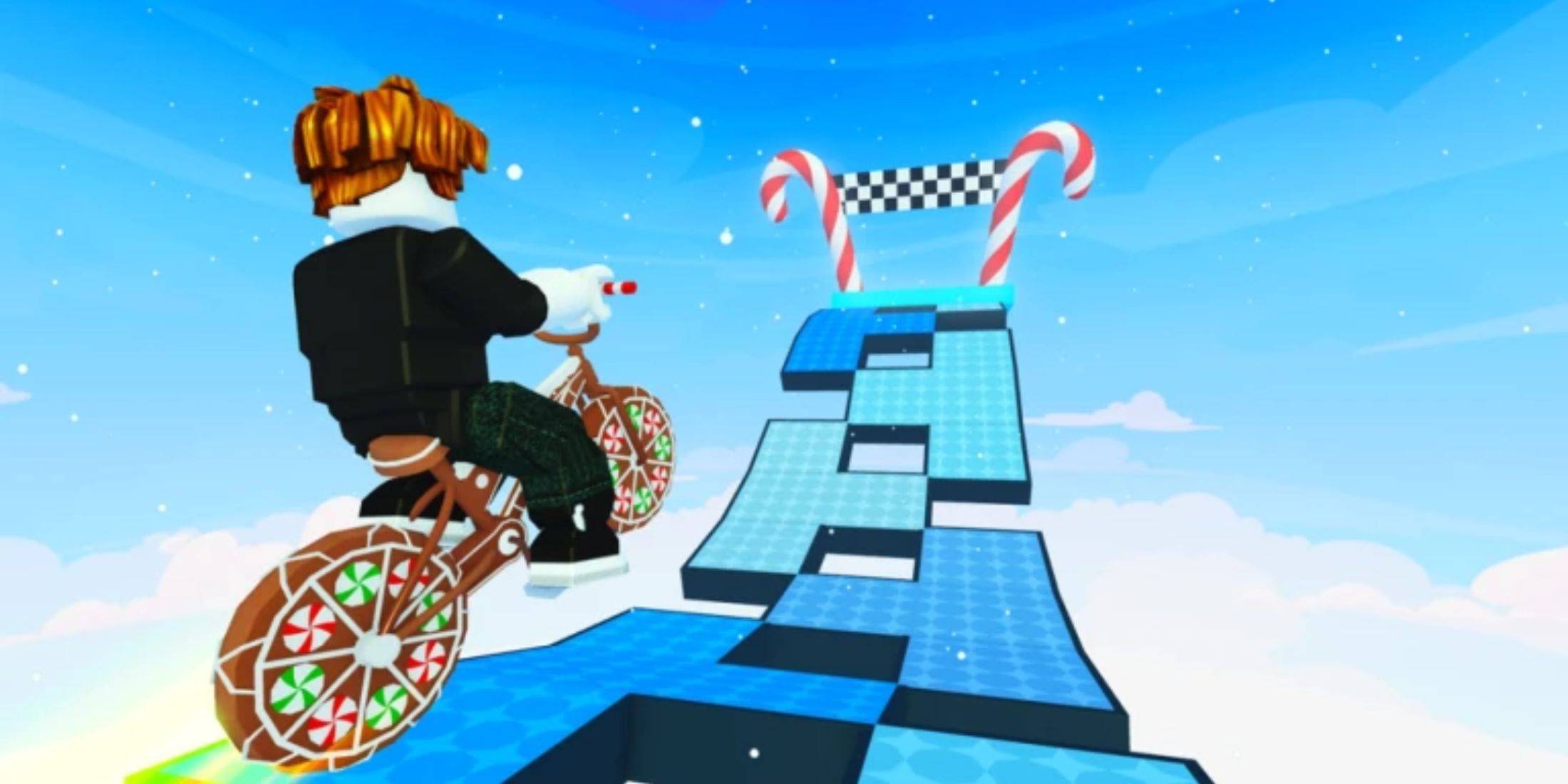 Jan 27,25Roblox: Bike Obby Codes (January 2025) Bike Obby: Unlock Awesome Rewards with These Roblox Codes! Bike Obby, the Roblox cycling obstacle course, lets you earn in-game currency to upgrade your bike, buy boosters, and customize your ride. Mastering the various tracks requires a top-tier bike, and thankfully, these Bike Obby codes deliver
Jan 27,25Roblox: Bike Obby Codes (January 2025) Bike Obby: Unlock Awesome Rewards with These Roblox Codes! Bike Obby, the Roblox cycling obstacle course, lets you earn in-game currency to upgrade your bike, buy boosters, and customize your ride. Mastering the various tracks requires a top-tier bike, and thankfully, these Bike Obby codes deliver -
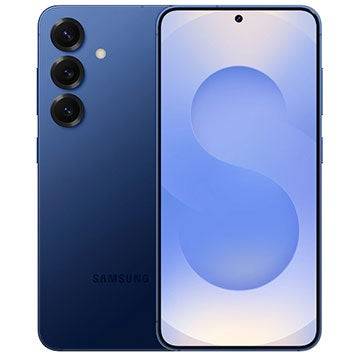 Feb 20,25Where to Preorder the Samsung Galaxy S25 and S25 Ultra Smartphones Samsung's Galaxy S25 Series: A Deep Dive into the 2025 Lineup Samsung unveiled its highly anticipated Galaxy S25 series at this year's Unpacked event. The lineup features three models: the Galaxy S25, S25+, and S25 Ultra. Preorders are open now, with shipping commencing February 7th. Samsung's web
Feb 20,25Where to Preorder the Samsung Galaxy S25 and S25 Ultra Smartphones Samsung's Galaxy S25 Series: A Deep Dive into the 2025 Lineup Samsung unveiled its highly anticipated Galaxy S25 series at this year's Unpacked event. The lineup features three models: the Galaxy S25, S25+, and S25 Ultra. Preorders are open now, with shipping commencing February 7th. Samsung's web -
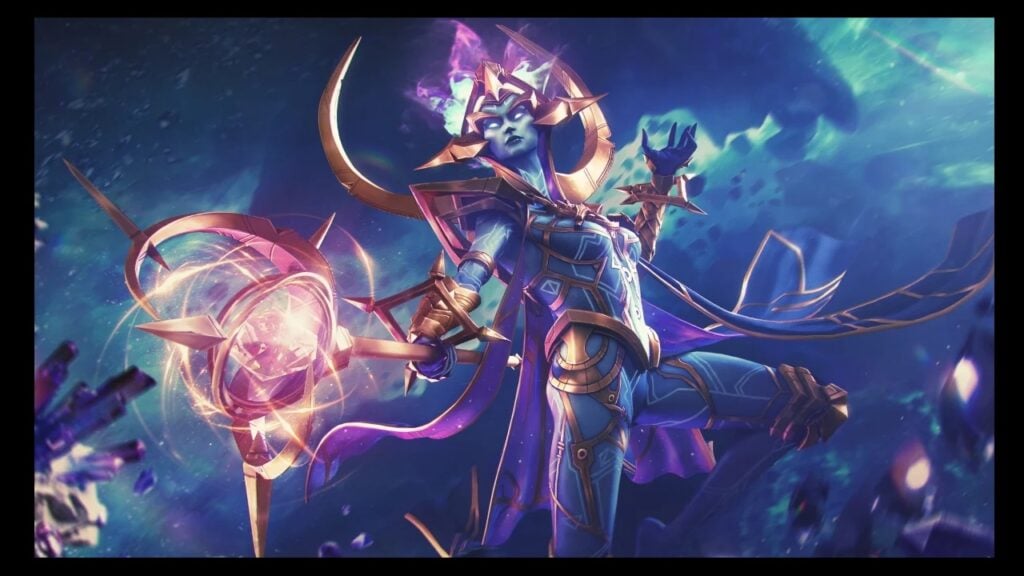 Jul 02,22Isophyne Debuts as Original Character in Marvel Contest of Champions Kabam introduces a brand-new original character to Marvel Contest of Champions: Isophyne. This unique champion, a fresh creation from Kabam's developers, boasts a striking design reminiscent of the film Avatar, incorporating copper-toned metallic accents. Isophyne's Role in the Contest Isophyne ent
Jul 02,22Isophyne Debuts as Original Character in Marvel Contest of Champions Kabam introduces a brand-new original character to Marvel Contest of Champions: Isophyne. This unique champion, a fresh creation from Kabam's developers, boasts a striking design reminiscent of the film Avatar, incorporating copper-toned metallic accents. Isophyne's Role in the Contest Isophyne ent -
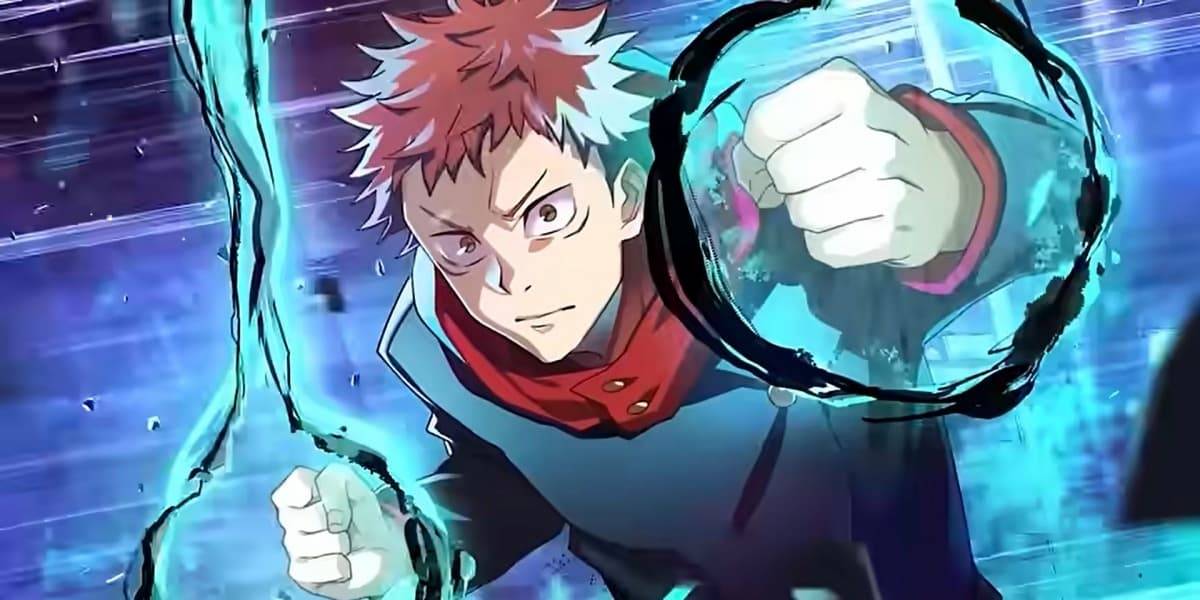 Jan 11,25Jujutsu Kaisen Phantom Parade: Tier List Revealed This Jujutsu Kaisen Phantom Parade tier list helps free-to-play players prioritize character acquisition. Note that this ranking is subject to change with game updates. Tier List: Tier Characters S Satoru Gojo (The Strongest), Nobara Kugisaki (Girl of Steel), Yuta Okkotsu (Lend Me Your Stren
Jan 11,25Jujutsu Kaisen Phantom Parade: Tier List Revealed This Jujutsu Kaisen Phantom Parade tier list helps free-to-play players prioritize character acquisition. Note that this ranking is subject to change with game updates. Tier List: Tier Characters S Satoru Gojo (The Strongest), Nobara Kugisaki (Girl of Steel), Yuta Okkotsu (Lend Me Your Stren
